Written by Lucie Villeneuve, nutritionist, M.Sc.
You’ve certainly heard about the anti-inflammatory diet before and the benefits it could have on your body. Reducing inflammation can definitely help with a lot of different health issues— so how can you go about it?
First of all, let’s define what inflammation is.
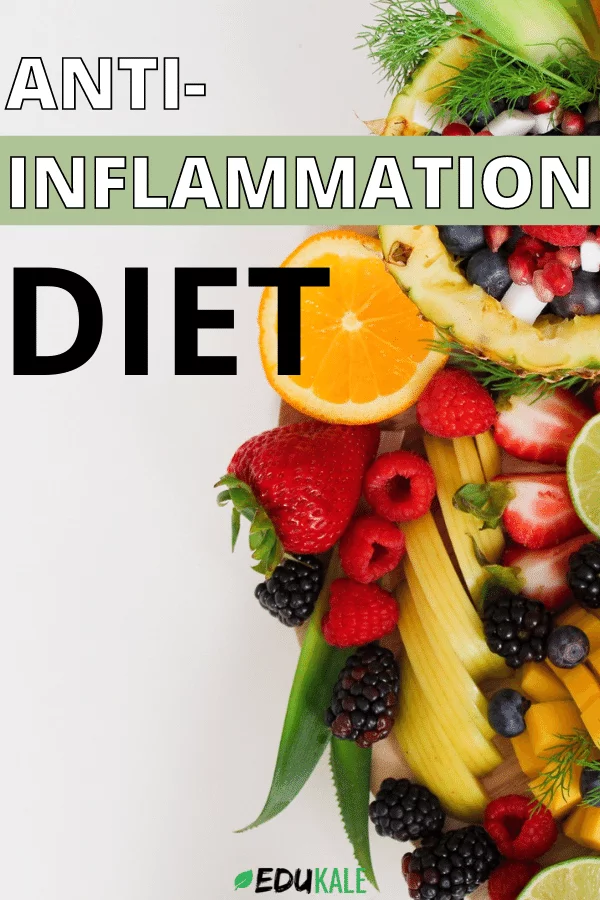
What is inflammation?
Inflammation is the reaction your body’s immune system has in response to a foreign invasion or irritant, which can be anything from paper-cut to a virus [1].
And that’s actually a good thing, because it enables your body to defend itself and repair any damage that the foreign agent has caused.
However, if inflammation lasts too long and becomes chronic, then that becomes associated with a lot of diseases like diabetes, irritable bowel syndrome, heart disease, auto-immune disorders, etc.
Food can definitely play a part in inflammation. Indeed, things like oxidative stress and altered glucose/lipid metabolism, which can happen because of our food choices, are associated with inflammation [2].
So here’s how you can use the food you eat as an ally to fight inflammation and chronic diseases.
Before I get into any specifics, in general, you need to ditch the standard American diet (SAD) and turn to a more Mediterranean diet, meaning tons of fruit and veggies, legumes and whole grains, some fish, olive oil, and very little meat. Study after study [3] shows that this type of diet is associated with less inflammation which in turn causes fewer chronic diseases.
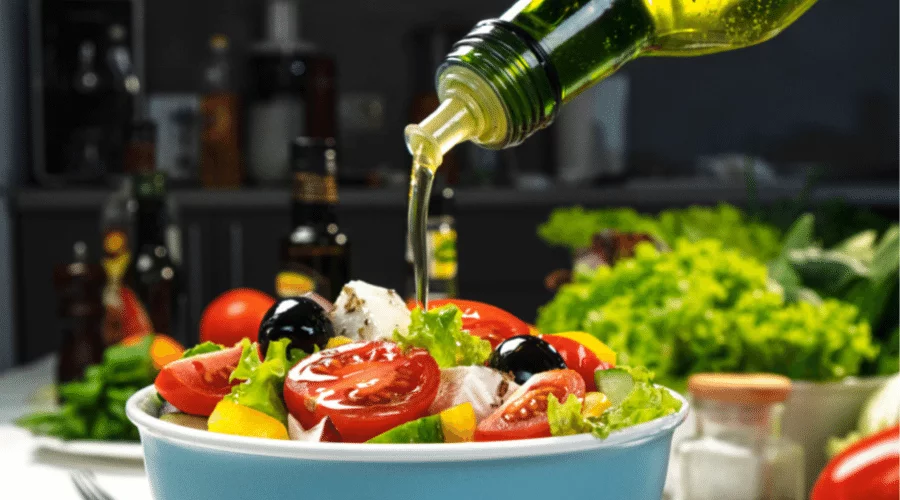
So now let’s get into some specifics.
Foods to eat on the anti-inflammatory diet
Eat a bunch of fruit and veggies
Fruit and vegetables are rich in antioxidants, and previously we talked about oxidative stress being a marker of inflammation. This stress is caused by free radicals that you encounter in your day-to-day life, and eating antioxidants can help neutralize them which in turn reduces inflammation [3].
So make sure that you are getting at least 5 portions of fruit and vegetables a day! You can find antioxidants like vitamin C in citrus fruits, strawberries, or bell peppers, carotenoids in carrots, peaches, or mangoes, lutein in leafy greens, and polyphenols in berries or grapes.
For more information, don’t forget to check out my article on antioxidants and where to find them [4].
Add herbs and spices everywhere
Speaking of antioxidants, herbs and spices are also extremely rich in that department. They’re also very anti-inflammatory, and extremely easy to add to your meals. I definitely recommend trying turmeric, the golden spice which has a plethora of benefits (make sure to combine it with black pepper to optimize its absorption!)
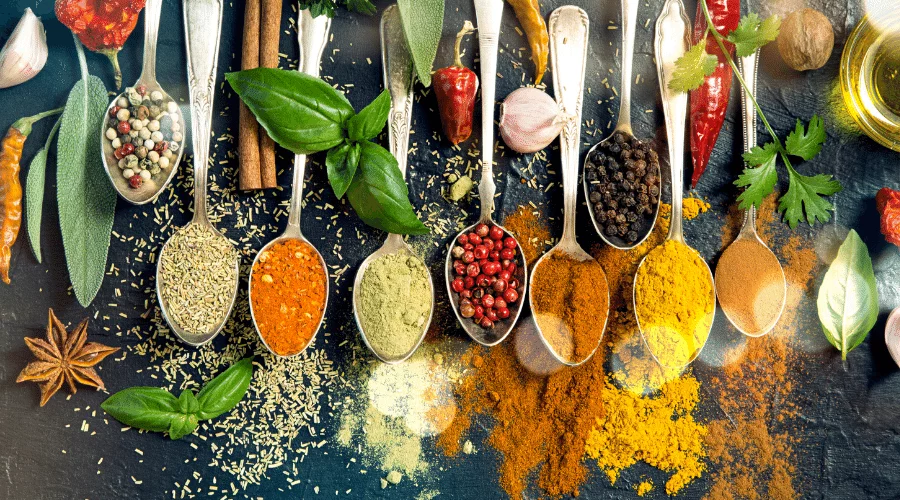
Herbs like oregano, rosemary, and thyme are rich in a type of antioxidant called polyphenols, and should be added to your dishes as often as you like.
Garlic is also packed with benefits— it can boost your immune system, has a high antioxidant content, and is highly anti-inflammatory. As for more sugary dishes, ginger and cinnamon are antimicrobial as well as anti-inflammatory.
Don’t hesitate to read my article on herbs and spices for more details!
Fuel yourself with whole grains
Contrary to what some people think, whole grains are very much anti-inflammatory, be it from direct effects, or from the positive outcomes they have on your gut bacteria which in turn lowers inflammation [5].
Not to mention their other great benefits like reducing many diseases, improving insulin sensitivity, lowering body weight, etc.
You should try to replace your refined grains with whole grains as much as you can (bulgur, buckwheat, brown rice, oats, quinoa, whole-wheat pasta…are all great options.
Stock up on legumes
Legumes are such a huge ally when it comes to anti-inflammation and health in general. They have a ton of phytochemicals that sound off-putting but are actually very anti-inflammatory. Lectins, for instance, have been shown to have a lot of anti-inflammatory activity along with other benefits. So make sure to get plenty of lentils, red beans, black beans, kidney beans, white beans, chickpeas…
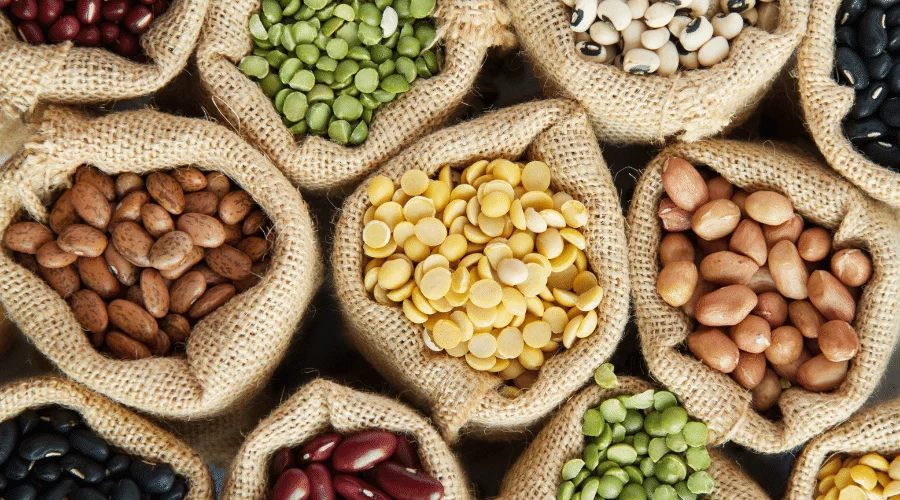
Include some nuts and seeds
Nuts and seeds, especially walnuts and flaxseeds, are rich in omega 3 which helps decrease inflammation and prevent neurodegenerative diseases linked to inflammation. Fish is also a great source of omega 3.
The most important thing to do is to focus on incorporating these beneficial foods into your diet. Without falling into restrictive habits, there are also foods that you should try to reduce or eat more moderately.
Foods to avoid to decrease inflammation
Reduce highly processed or refined foods
Things like fast food, frozen meals, chips, biscuits/cookies/candy, and processed meats are all associated with high blood levels of inflammatory markers [6].
They all contain advanced glycation end products as well, which can enhance oxidative stress and inflammation [7].
You can read the article I wrote on AGES here.
Limit fried foods
You should limit anything that has been fried in oil for a substantial amount of time, which also leads to AGEs.
Furthermore, these foods contain trans fats which are associated with high levels of inflammation.
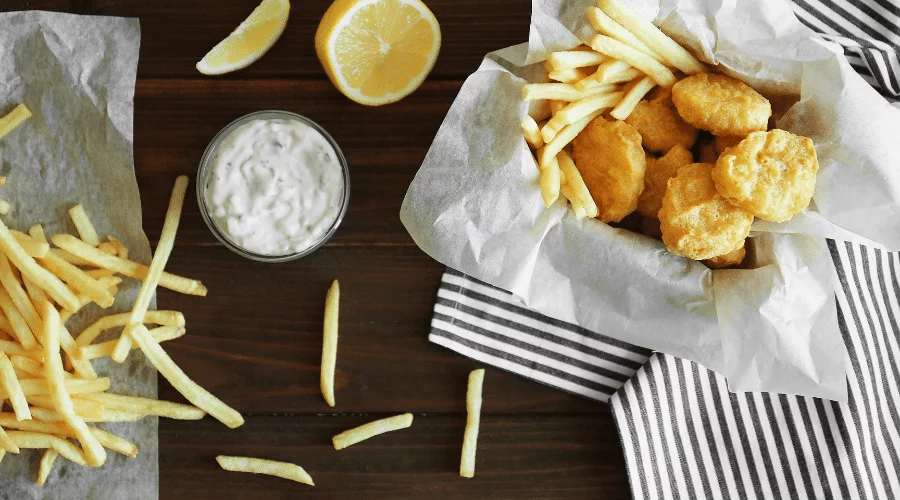
Avoid alcohol
Alcohol is highly associated with chronic inflammation. A molecule derived from the microbiome, LPS, is associated with pathways of inflammation in the body. When you drink alcohol it increases its presence in the gut, which increases inflammation [8].
You should limit your intake to 1-2 drinks a day. (Even less if you can!)
And some bonus tips:
Other important things to decrease inflammation include exercising more and having higher quality/longer sleep. Keeping your stress levels as low as possible is also crucial— it’s important to prioritize rest and wellness, to do things that make you feel good, and to live a slower lifestyle.
You should look at the anti-inflammatory diet as a complete healthy lifestyle change rather than an actual diet. While there are foods to prefer over others, nothing is off-limits and anything can be enjoyed in moderation.
-Lucie

